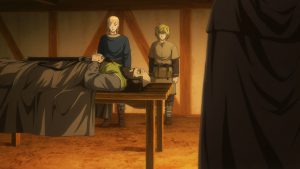 The old false main character syndrome really rears its head with Vinland Saga. This is a long manga, and I flatter myself that I can see where Yukimura Makoto is going with it – the larger arc of the narrative is Thorfinn’s from a poetic and philosophical standpoint. But in anime terms, we’ve basically jumped straight from Thors being the heart of the story to Askeladd – not just in terms of screen time, but genuine development and thematic importance. Thorfinn has mostly been a participant observer – so far. But the gears are grinding, beneath the narrative surface.
The old false main character syndrome really rears its head with Vinland Saga. This is a long manga, and I flatter myself that I can see where Yukimura Makoto is going with it – the larger arc of the narrative is Thorfinn’s from a poetic and philosophical standpoint. But in anime terms, we’ve basically jumped straight from Thors being the heart of the story to Askeladd – not just in terms of screen time, but genuine development and thematic importance. Thorfinn has mostly been a participant observer – so far. But the gears are grinding, beneath the narrative surface.
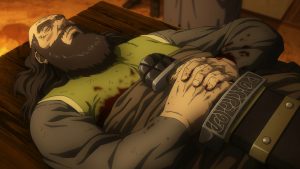 I don’t think it’s a coincidence that things have fallen out this way, even if Yabuta Shuuhei and Seko Hiroshi have re-ordered things a bit for the anime. Thors and Askeladd are the poles of this story in many ways. Each of them exerts a magnetic attraction on Thorfinn, and it’s as yet unclear which pull is stronger. Askeladd represents the darkness and Thors the light in many ways – but Askeladd also saw in Thors the possibility of achieving his own ends in a nobler and more powerful manner than he’s forced to go about trying to do so. We’ve been carefully and artfully shown the two major influences on Thorfinn’s life – eventually he’ll have to decide which course is his to follow.
I don’t think it’s a coincidence that things have fallen out this way, even if Yabuta Shuuhei and Seko Hiroshi have re-ordered things a bit for the anime. Thors and Askeladd are the poles of this story in many ways. Each of them exerts a magnetic attraction on Thorfinn, and it’s as yet unclear which pull is stronger. Askeladd represents the darkness and Thors the light in many ways – but Askeladd also saw in Thors the possibility of achieving his own ends in a nobler and more powerful manner than he’s forced to go about trying to do so. We’ve been carefully and artfully shown the two major influences on Thorfinn’s life – eventually he’ll have to decide which course is his to follow.
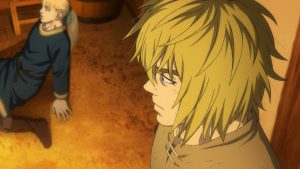 I don’t think there’s any question that one reason Askeladd took Thorfinn under his wing was because he saw something of himself in the boy’s desperate thirst for revenge. We didn’t know it at the time, but Askeladd has dedicated his life to vengeance too – vengeance for the crimes committed against his mother and her people. Askeladd’s nature is different than Thors or his son – his greatest weapon is his ability to deceive and to spot deceit in others. But when one’s entire life is a lie, perhaps there are limits on how long even someone as brilliant and fearless as Askeladd can keep the house of cards from collapsing.
I don’t think there’s any question that one reason Askeladd took Thorfinn under his wing was because he saw something of himself in the boy’s desperate thirst for revenge. We didn’t know it at the time, but Askeladd has dedicated his life to vengeance too – vengeance for the crimes committed against his mother and her people. Askeladd’s nature is different than Thors or his son – his greatest weapon is his ability to deceive and to spot deceit in others. But when one’s entire life is a lie, perhaps there are limits on how long even someone as brilliant and fearless as Askeladd can keep the house of cards from collapsing.
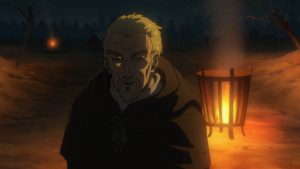 As always with Vinland Saga, the most memorable moments come in the quiet conversations between characters. Before a truly harrowing opening sequence which sees Askeladd cheerfully supervising (and commandeering) the torture of an English captain, he has a conversation with Bjorn in the woods. Bjorn openly questions Askeladd’s decision to murder Ragnar, and suggests it’s backfired. Askeladd asks Bjorn why he’s followed him these many years, and the blunt and straightforward Bjorn can only offer “Because I wanted to”. Askeladd counters with “I’m the same. I choose my own lord, too. My lord must be the type of man who makes me want to serve him.” He tries to pass it off as a joke, but this is not a man who says such things frivolously. The mind wanders back to Thors of course, but the significance of this statement is fascinating to ponder.
As always with Vinland Saga, the most memorable moments come in the quiet conversations between characters. Before a truly harrowing opening sequence which sees Askeladd cheerfully supervising (and commandeering) the torture of an English captain, he has a conversation with Bjorn in the woods. Bjorn openly questions Askeladd’s decision to murder Ragnar, and suggests it’s backfired. Askeladd asks Bjorn why he’s followed him these many years, and the blunt and straightforward Bjorn can only offer “Because I wanted to”. Askeladd counters with “I’m the same. I choose my own lord, too. My lord must be the type of man who makes me want to serve him.” He tries to pass it off as a joke, but this is not a man who says such things frivolously. The mind wanders back to Thors of course, but the significance of this statement is fascinating to ponder.
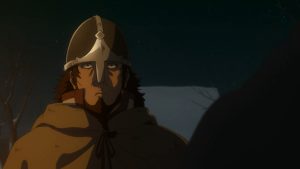 Askeladd trusts Bjorn to be sure (this will be a matter of great importance later in the episode) but you have to ask – does he feel anything for him beyond that? Does he feel anything for anyone? He hates the English to be sure – but it was the Danes who kidnapped and enslaved his mother. How ironic it is that it’s really only Thorfinn that Askeladd can trust besides Bjorn – the son of a man he murdered who’s dedicated his life to killing Askeladd in revenge. He knows where Thorfinn stands – there’s no doubting his motives. Askeladd is no good to him if he’s killed by someone else. And Thorfinn is the son of the one man in the world we know that Askeladd truly respected.
Askeladd trusts Bjorn to be sure (this will be a matter of great importance later in the episode) but you have to ask – does he feel anything for him beyond that? Does he feel anything for anyone? He hates the English to be sure – but it was the Danes who kidnapped and enslaved his mother. How ironic it is that it’s really only Thorfinn that Askeladd can trust besides Bjorn – the son of a man he murdered who’s dedicated his life to killing Askeladd in revenge. He knows where Thorfinn stands – there’s no doubting his motives. Askeladd is no good to him if he’s killed by someone else. And Thorfinn is the son of the one man in the world we know that Askeladd truly respected.
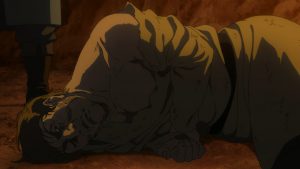 When the chips are down and everything seems to be falling apart around him, it’s Bjorn and Thorfinn to whom Askeladd entrusts the hysterically grieving Canute, the reason for this entire wild gamble he’s taken. When a few deserters are offered to him after the news that Thorkell has caught up Askeladd invites them and anyone else who wants to go ahead and desert (Thorkell casually kills the lot of them as “useless”). Askeladd knows he’s already losing his grip on his army, and killing deserters will only hasten his downfall – and that he’d rather have deserters as far away as possible (even in the enemy camp) than lurking in his own army as ticking time bombs.
When the chips are down and everything seems to be falling apart around him, it’s Bjorn and Thorfinn to whom Askeladd entrusts the hysterically grieving Canute, the reason for this entire wild gamble he’s taken. When a few deserters are offered to him after the news that Thorkell has caught up Askeladd invites them and anyone else who wants to go ahead and desert (Thorkell casually kills the lot of them as “useless”). Askeladd knows he’s already losing his grip on his army, and killing deserters will only hasten his downfall – and that he’d rather have deserters as far away as possible (even in the enemy camp) than lurking in his own army as ticking time bombs.
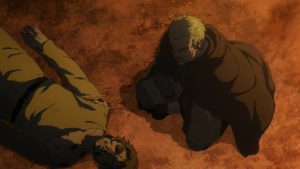 Superficially, it appears that it’s all coming apart for Askeladd. Thorkell is mere hundreds of meters away across a shallow river, and almost the entirety of Askeladd’s force has turned on him. This is the price Askeladd has to pay for the manner in which he’s chosen to lead, but history and fiction both teach us that men like Askeladd are like cockroaches, incredibly fast when cornered and difficult to kill. Knowing him Askeladd will have had contingency plans in mind for this moment which, brilliant as he is, he had to know was coming sooner or later. The advantage of having no loyalty to his men is that Askeladd can betray them now without hesitation – they’ve never been more than tools to him in the first place. Things may look grim, but I suspect Askeladd has too much resourcefulness – and will to survive – to let this be the end of him.
Superficially, it appears that it’s all coming apart for Askeladd. Thorkell is mere hundreds of meters away across a shallow river, and almost the entirety of Askeladd’s force has turned on him. This is the price Askeladd has to pay for the manner in which he’s chosen to lead, but history and fiction both teach us that men like Askeladd are like cockroaches, incredibly fast when cornered and difficult to kill. Knowing him Askeladd will have had contingency plans in mind for this moment which, brilliant as he is, he had to know was coming sooner or later. The advantage of having no loyalty to his men is that Askeladd can betray them now without hesitation – they’ve never been more than tools to him in the first place. Things may look grim, but I suspect Askeladd has too much resourcefulness – and will to survive – to let this be the end of him.


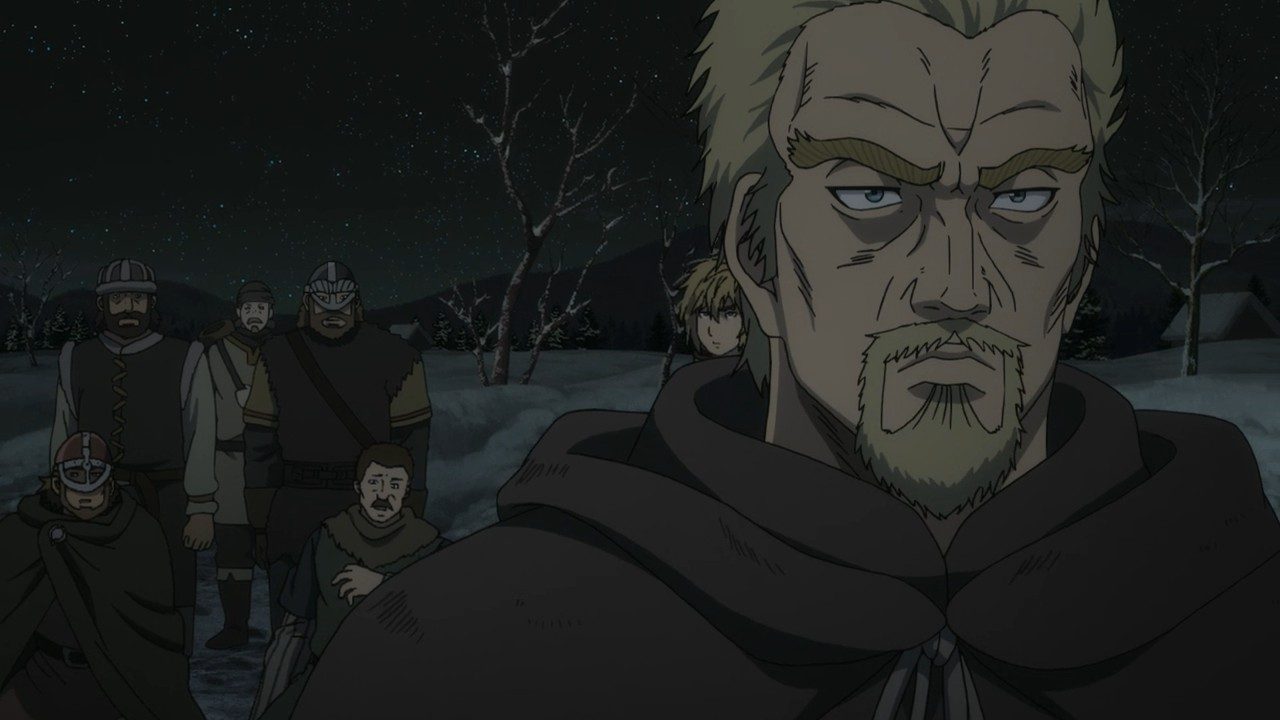
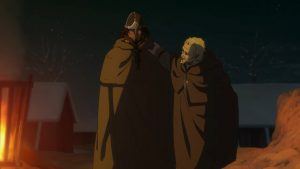
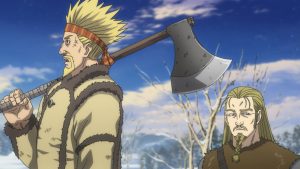
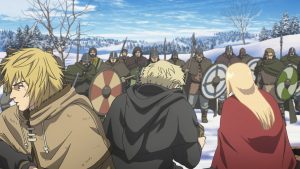
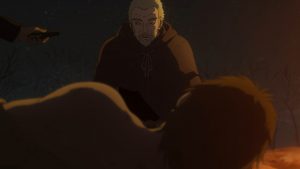
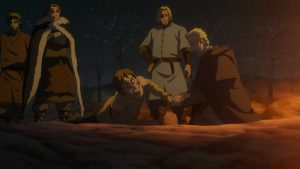
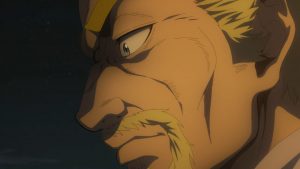
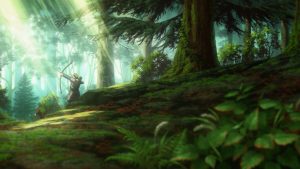
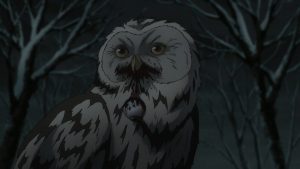
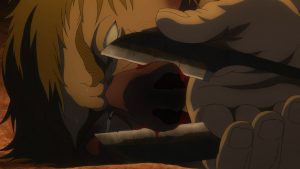
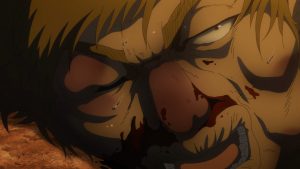
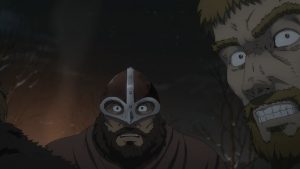
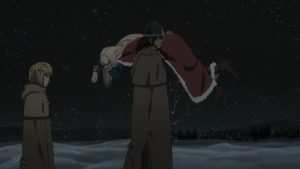
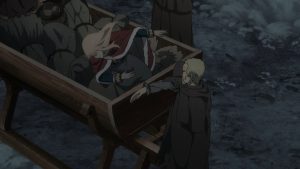
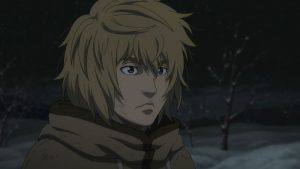
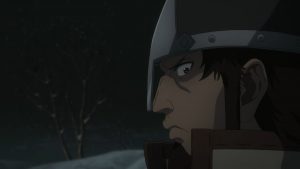
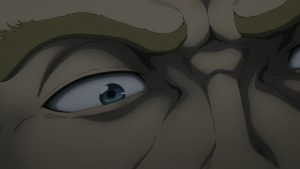
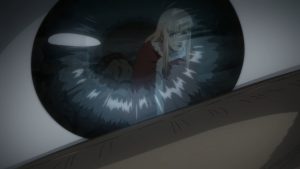
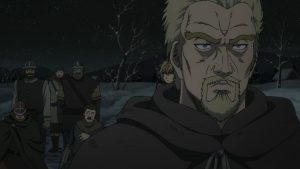

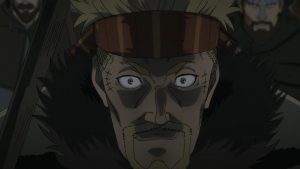
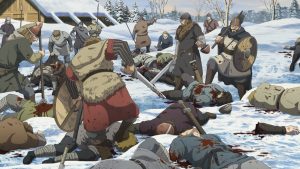
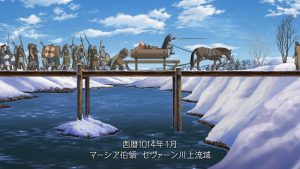
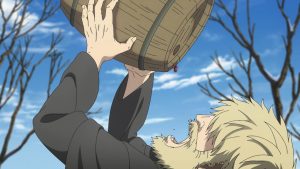
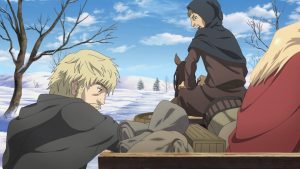
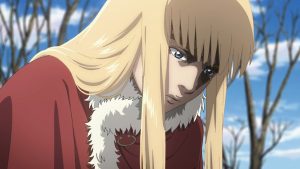
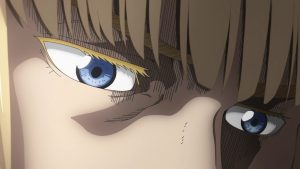
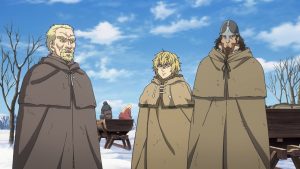
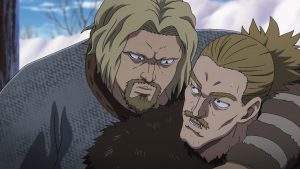
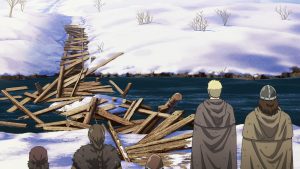
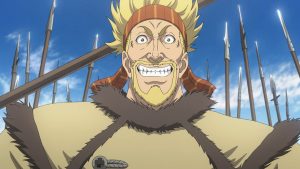
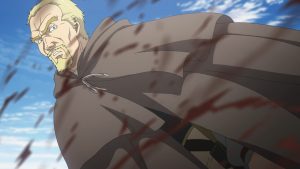
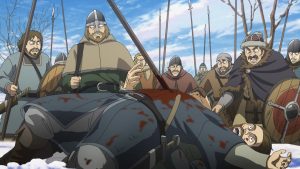
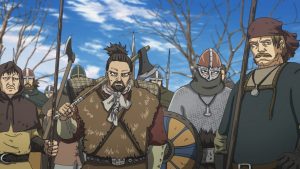
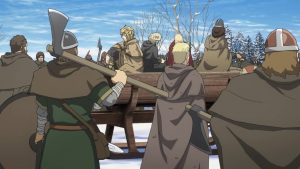
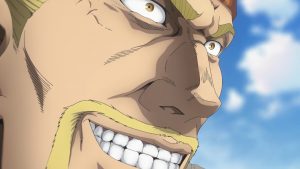



Alex
October 28, 2019 at 9:52 pmThe implied idea is fascinating — Askeladd as a second King Arthur using the despised Danes as a weapon in his grudge match against the Anglo-Saxons. Of course the Romano-Celtic Britons who fought the Saxon invaders were also Christians resisting an aggressive pagan incursion— exactly the position the Saxons now find themselves in. I wonder if Askeladd is aware of the irony?
Jindujun93
October 28, 2019 at 9:57 pmThe conversation between Askeladd and Bjorn, and in general the whole issue of trust between Askeladd and his men, is actually even more interesting to the backdrop of episode 13 earlier in its run. The difference between Bjorn and the other men is that the others were in for the money – as long as Askeladd would keep making that for them, they’d continue to follow him (in the words of Thorgrimm – we finally got the names of those two vikings this week). While Bjorn is the one genuinely behind Askeladd seeing by how peeved he was that Askeladd was keeping a lot of secrets.
I already liked Bjorn in the manga, even though never quite as much as the bigger players like Askeladd. That being said, the anime so far has endeared him even further to me so far, both with how he is portrayed from the manga material, but also how he’s shown in the anime-original content. There was a neat little scene in episode 5 – Thorfinn encounters Bjorn in the woods, and he just non-chalantly picks up mushrooms to eat later. It’s easy to miss, but he actually leaves some behind for Thorfinn despite there literally being no reason to do so for him, which doubles as him showing which were safe to eat (Thorfinn was struggling with finding food earlier that episode, after all). It’s fascinating that he, as the one who is a berserker in combat, is the closest thing to a heart that the group has if Askeladd is the head.
And of course, there’s Askeladd’s statement from episode 13 how his men trust him, after all… yeah, now that’s an ironic echo alright after this episode.
The stage has been set, in any case – I’m genuinely looking forward to the next few weeks of Vinland, because they will have some of the material I’ve been looking forward to ever since the anime got announced.
Lark
October 28, 2019 at 11:15 pmWatching this while rewatching Shoukoku no Altair has been a very interesting experience. I keep likening Canute to Mahmut (and occasionally to Orhan, if only because of the pampered vibe they share).
Guardian Enzo
October 28, 2019 at 11:18 pmHmmm. Gotta say, I don’t see it with Mahmut – he’s made of much sterner stuff then what we’ve seen of Canute so far.
Lark
October 29, 2019 at 12:11 amHmm, true. Maybe it’s the blond hair that’s throwing me off.
Marty
October 29, 2019 at 4:53 amThis episode reminded me that Askeladd’s group isn’t made up of warriors as much as it is made up of pirates. These guys are opportunistic raiders, they followed Askeladd because he is resourceful and is successful, but once the going gets rough, they’ll turn in a heartbeat. If anything, this situation is almost the antithesis of Askeladd’s sacking of the Norman Castle in episode 7, where victory was all b guaranteed.
Guardian Enzo
October 29, 2019 at 7:42 amYeah, it’s true. These guys are more about slaughtering civilians and sneak attacks than straight up battlefield showdowns. But surely in 20 years or whatever it’s been they’ve seen a few conventional battles?
Marty
October 30, 2019 at 5:30 amI’m sure they’ve seen their fair share of pitched battles, but it takes a certain level of courage/stupidity to stand outnumbered, isolated, and against the monster that is Thorkell. I doubt Askeladd’s men have either at the moment.